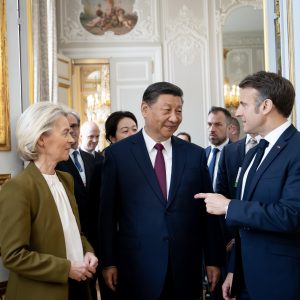Chinese President Xi Jinping’s visits to Paris, Belgrade, and Budapest received mixed reviews across the transatlantic bloc. Some cited further pressure on China to influence Russia as a positive factor, while others noted that China was making a bridgehead into Europe. Moscow, while remaining outwardly quiet, benefited from China’s successful shuttle diplomacy both in practical ways and because it fit into Russia’s grand vision for world affairs.
In a global sense, Xi’s bilateral diplomacy achieving gains in trade negotiations and forging a long-term vision for peace is compatible with Moscow’s Foreign Policy Concept. As Russian President Vladimir Putin recently put it, Moscow considers itself “in the avant garde of creating a just world order.”
Part of this framework of international affairs involves a higher reliance on bilateral, out-of-bloc, relations. Xi’s visits are emblematic of this thinking, whereby sovereign nations make deals with respect to each other’s strategic cultures, as opposed to a bloc-driven zero-sum game. So, on a conceptual level, Xi’s tour of Europe is compatible with how Russia would like to see the world run.
Thus, it should be no surprise that the official reaction in Moscow was mute – even to Xi improving relations with France, which is the most vocal advocate for NATO boots on the ground in Ukraine. Under the current strategy, Russia’s outward silence is a sign of respect and non-interference. This is opposite to the commotion among Western powers, which are threatening tariffs and bringing spy scandals to the public square. The contrast is telling, and the Kremlin may think this sets a positive tone for Putin’s visit to Beijing on May 16 and 17.
Further, the perspective from Moscow is that French President Emmanuel Macron’s behavior during Xi’s visit showed China that Russia is winning. First, calling for an “Olympic Truce” was out of character, especially after Macron’s grand interview in The Economist and various public statements that hyped up France’s role as a global power.
Macron’s retreat, made in Xi’s presence, was speculated to have taken place partially in response to a serious warning and changing nuclear posture by Russia. So, in Moscow’s eyes, Russia has showed it can project force across Europe.
At the same time, the new government positions Russia as gearing up for long-term hostilities as the Defense Ministry is now led by a veteran economist, Andrei Belousov. Sergei Shoigu, the previous defense minister, has been elevated to the Security Council, where he is likely to continue leveraging his unrivaled closeness with military colleagues in China. The signal to China is clear – Russia is an able ally, and intends to tighten the relationship.
From a tactical perspective, Xi’s shuttle diplomacy helped Moscow too. The visits, while a positive for EU economies, created rifts among the hawks and doves across the continent. This is an opportunity for Russia to work closer with allies or sympathizers across the EU.
Then, China reinforced its support for what Moscow sees as the two remaining nations in Europe with strategic autonomy – Hungary and Serbia – while the trade discussions with France showed that there are benefits to be reaped if countries step out of the hawkish bubble.
And finally, perhaps most importantly for Russia, the EU’s pressure campaign seems to have backfired. European Commission President Ursula von der Leyen, who joined the meeting alongside Macron, reportedly pressed Xi on China’s relationship with Moscow. Von der Leyen’s words were counterproductive. China tends to react harshly to diplomatic pressure, so unsurprisingly, Xi “bristled” at the attempt to influence his nation’s foreign policy.
At the same time, if we analyze the situation in terms of initiative, the pressure on China shows that it is Beijing that has assumed the position of global kingmaker, taking the crown from Europe by the EU’s own admission.
The rest of the world can thus be more confident in Beijing’s designs, including non-alignment with sanctions against Russia and trade in national currencies, which only accelerates the ongoing transformation of global affairs.
Going back to Putin’s quote on Russia being in the “avant garde” of reforming the global order, the above factors can all be interpreted as positive for Moscow. Russia shows sanctions can be resisted, and military gains can be made, while China offers an off-ramp for those willing to cooperate. So, from Russia’s perspective, Xi’s tour to Europe set a strong foundation for Putin’s current visit to Beijing.
Apart from the points raised above, the argument is underscored by Xi saying China’s friendship with Serbia is “forged in blood.” Bold words – and astonishingly close to Moscow’s historic position. If this is not a sign of alignment, what is?

































